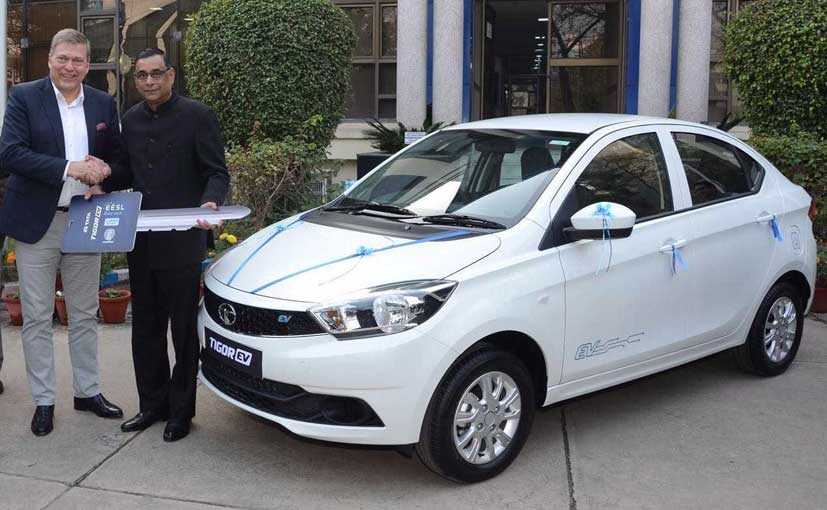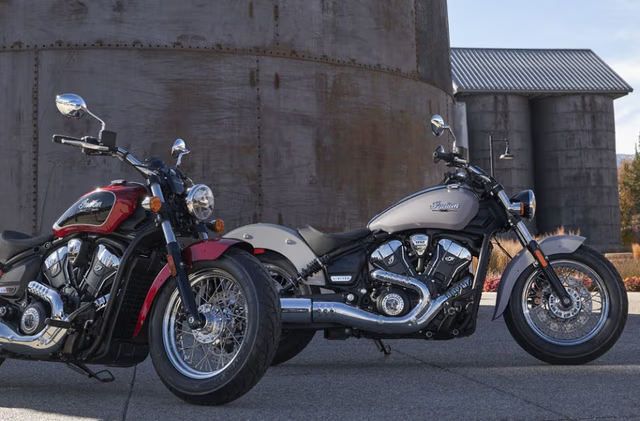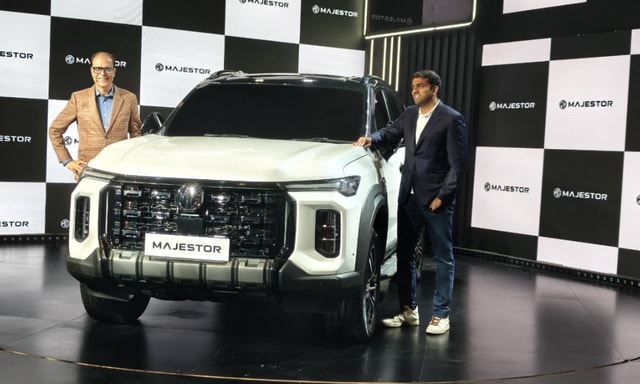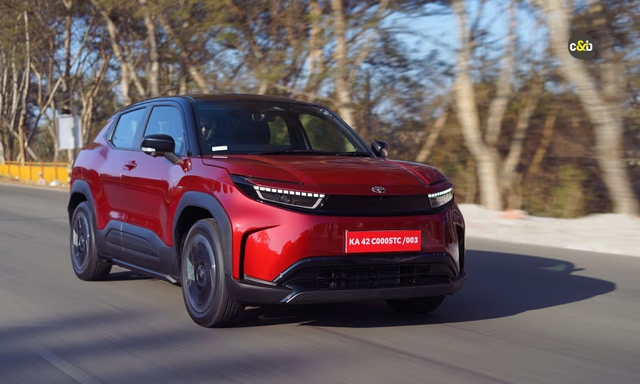Government Officials Reject Using Electric Cars Under EESL Scheme

State-run Energy Efficiency Services Ltd's (EESL) procurement of electric cars from Mahindra Electric and Tata Motors was seen as a big push towards electric mobility in India. The cars sourced were to be used by government officials in place of conventional vehicles. However, the move seems to have not gone down well with senior government officials, who have refused to use electric cars for daily use. According to a report in Live Mint, a government source who didn't wish to be named said that the senior officials have cited poor performance and low range of the electric vehicles, as one of the reasons to refuse using the electric cars. This does emerge as a blow to the government's ambitions of turning India into an electric vehicle country by 2030.
The first phase of the EESL tender saw Tata Motors and Mahindra supply 350 units and 150 units respectively to EESL. Phase 2 of the tender includes the delivery of another 9500 units of electric vehicles to EESL with Mahindra providing 40 per cent of the total order. 'The electric vehicles including the Tata Tigor EV and Mahindra e-Verito failed to run even 80-82 km on a single charge within city limits amd the battery capacity was not up to the mark when compared to the global standard', as per the source. At present, both the EVs in application use a 17 kW battery, as opposed to the global standard 27-35 kW. This, in turn, limits the range on both vehicles, which is lower than what the manufacturers claimed.
EESL says that over 150 electric cars are currently plying on the roads of Delhi and Andhra Pradesh. A spokesperson for EESL said, "Since it is a new technology, we wanted to gain confidence on our products before delivering it to our clients. We will be deploying about 200-250 electric vehicles by mid-July. The conditions of the second tender are being re-evaluated and will be released soon. EESL will continue to enable more energy and fuel savings by creating a robust market for e-mobility in India."
As per the initial schedule, all the electric vehicles were supposed to be delivered by November 30, 2017. However, the deadline was later pushed to December 30, 2017, citing the lack of infrastructure for charging EVs. About six months later, only the first batch of electric vehicles have been supplied as per the company.
While concerns over the electric vehicle range are genuine given the impracticality of it, there have also been concerns amidst government officials who miss out on the car fuel allowance as a result. The report quotes a senior executive stating that government officials cannot claim fuel expenses on electric vehicles, which is a huge sum, and is one of the reasons, they are not accepting the EVs.
Responding to the matter, a Tata Motors spokesperson was quoted saying, "As part of our tender with Energy Efficiency Services, we have already completed the production of 250 cars and initiated the execution of phase II orders. We are committed to the government's e-mobility mission by 2030, and continue to work in a collaborative manner to facilitate faster adoption of electric vehicles and to build a sustainable future for India."
Following the first tender for 10,000 electric vehicles announced last year, the second tender for an additional 10,000 EVs was announced in March this year, but has been postponed to 2019 due to lack of charging infrastructure. The total investment for the 20,000 EVs was said to be Rs. 2400 crore according to EESL Managing Director, Saurabh Kumar. The state-run firm is also said to be in talks with state officials of Telangana, Madhya Pradesh and Rajasthan among others for supplying electric vehicles. The firm is already committed to supplying 8000 EVs to Gujarat and 1000 electric cars to Maharashtra.
However, with government officials refusing to use EVs, there could be further delays in the procurement of the same. One of the sources also mentioned that the lack of quality products in the segment has also led to the postponement of the third tender. Factoring in the drawbacks, the report further suggests that Mahindra is working on improving the range on the e-Verito.
Latest News
 car&bike Team | Feb 12, 2026End Of The Road For Diesel Vehicles? Niti Aayog Pushes For Adoption Of Cleaner FuelsIn its latest report, Niti Aayog has advocated the use of cleaner fuels like CNG while doing a gradual phase out of Diesel technology1 min read
car&bike Team | Feb 12, 2026End Of The Road For Diesel Vehicles? Niti Aayog Pushes For Adoption Of Cleaner FuelsIn its latest report, Niti Aayog has advocated the use of cleaner fuels like CNG while doing a gradual phase out of Diesel technology1 min read Janak Sorap | Feb 11, 2026BMW Motorrad Announces GS Experience 2026 Training ProgramBMW Motorrad has announced the schedule for its GS Experience 2026 rider training program, set to take place across nine cities in India.1 min read
Janak Sorap | Feb 11, 2026BMW Motorrad Announces GS Experience 2026 Training ProgramBMW Motorrad has announced the schedule for its GS Experience 2026 rider training program, set to take place across nine cities in India.1 min read car&bike Team | Feb 11, 2026Indian Motorcycle Won’t Build Entry-Level Bike, Says New CEOThe brand’s new CEO Mike Kennedy has all but denied any plans of Indian Motorcycle looking at entry-level bikes in the foreseeable future.1 min read
car&bike Team | Feb 11, 2026Indian Motorcycle Won’t Build Entry-Level Bike, Says New CEOThe brand’s new CEO Mike Kennedy has all but denied any plans of Indian Motorcycle looking at entry-level bikes in the foreseeable future.1 min read car&bike Team | Feb 11, 2026TVS Gives iQube Electric Scooter To Vatican City State For Daily OperationsAiming to promote zero-emission mobility, the e-scooters are expected to help with the daily operational needs of the Vatican.1 min read
car&bike Team | Feb 11, 2026TVS Gives iQube Electric Scooter To Vatican City State For Daily OperationsAiming to promote zero-emission mobility, the e-scooters are expected to help with the daily operational needs of the Vatican.1 min read Jaiveer Mehra | Feb 11, 2026Mahindra To Launch Two Facelifted SUVs In India In 2026Carmaker revealed that it intended to introduce a total of 5 models across ICE and EV in India in 2026, including the XUV 7XO, XEV 9S and BE 6 Formula E Edition.1 min read
Jaiveer Mehra | Feb 11, 2026Mahindra To Launch Two Facelifted SUVs In India In 2026Carmaker revealed that it intended to introduce a total of 5 models across ICE and EV in India in 2026, including the XUV 7XO, XEV 9S and BE 6 Formula E Edition.1 min read Carandbike Team | Feb 11, 2026MG Majestor India Launch Tomorrow: What To Expect?Essentially an updated version of the MG Gloster, the new Majestor will be positioned as a more premium derivative, taking on rivals like the Toyota Fortuner.1 min read
Carandbike Team | Feb 11, 2026MG Majestor India Launch Tomorrow: What To Expect?Essentially an updated version of the MG Gloster, the new Majestor will be positioned as a more premium derivative, taking on rivals like the Toyota Fortuner.1 min read
 Bilal Firfiray | Feb 11, 2026Mercedes-AMG CLE 53 Coupe Review: The Goldilocks AMG?The Mercedes-AMG CLE 53 Coupe is a concoction of hooliganistic performance and everyday usability. Here’s why this Rs 1.5 crore two-door AMG might be the perfect modern sports coupe for India.6 mins read
Bilal Firfiray | Feb 11, 2026Mercedes-AMG CLE 53 Coupe Review: The Goldilocks AMG?The Mercedes-AMG CLE 53 Coupe is a concoction of hooliganistic performance and everyday usability. Here’s why this Rs 1.5 crore two-door AMG might be the perfect modern sports coupe for India.6 mins read Girish Karkera | Feb 11, 2026Toyota Ebella EV Review: Compact And Fun-To-Drive With The Promise Of Stress-Free AftersalesNo hiding the fact that it is a clone of the Maruti Suzuki eVitara, but the first all-electric Toyota in India is reasonably well-rounded8 mins read
Girish Karkera | Feb 11, 2026Toyota Ebella EV Review: Compact And Fun-To-Drive With The Promise Of Stress-Free AftersalesNo hiding the fact that it is a clone of the Maruti Suzuki eVitara, but the first all-electric Toyota in India is reasonably well-rounded8 mins read Bilal Firfiray | Feb 10, 2026Tata Punch EV Long Term Review: Small EV With A Big-Hearted PersonalityWith the new Punch EV Facelift just around the corner, we decided to take a look at what it excels at and what could be improved.7 mins read
Bilal Firfiray | Feb 10, 2026Tata Punch EV Long Term Review: Small EV With A Big-Hearted PersonalityWith the new Punch EV Facelift just around the corner, we decided to take a look at what it excels at and what could be improved.7 mins read Bilal Firfiray | Feb 4, 2026Volkswagen Tayron R-Line Review: Sensible Flagship For IndiaVolkswagen has introduced a made-in-India flagship SUV that offers space, comfort, performance, and German driving finesse in a practical three-row package. But is the Tayron R-Line good enough?6 mins read
Bilal Firfiray | Feb 4, 2026Volkswagen Tayron R-Line Review: Sensible Flagship For IndiaVolkswagen has introduced a made-in-India flagship SUV that offers space, comfort, performance, and German driving finesse in a practical three-row package. But is the Tayron R-Line good enough?6 mins read Preetam Bora | Feb 2, 2026TVS NTorq 150 Road Test Review: Bigger, Better & More Efficient!We test the new TVS NTorq 150 out in the real world to get a sense of what it offers in terms of performance, dynamics and fuel economy.7 mins read
Preetam Bora | Feb 2, 2026TVS NTorq 150 Road Test Review: Bigger, Better & More Efficient!We test the new TVS NTorq 150 out in the real world to get a sense of what it offers in terms of performance, dynamics and fuel economy.7 mins read




























































































































